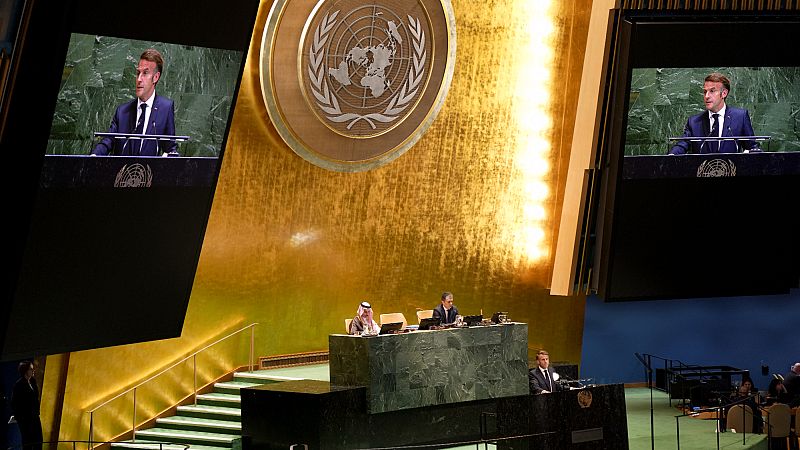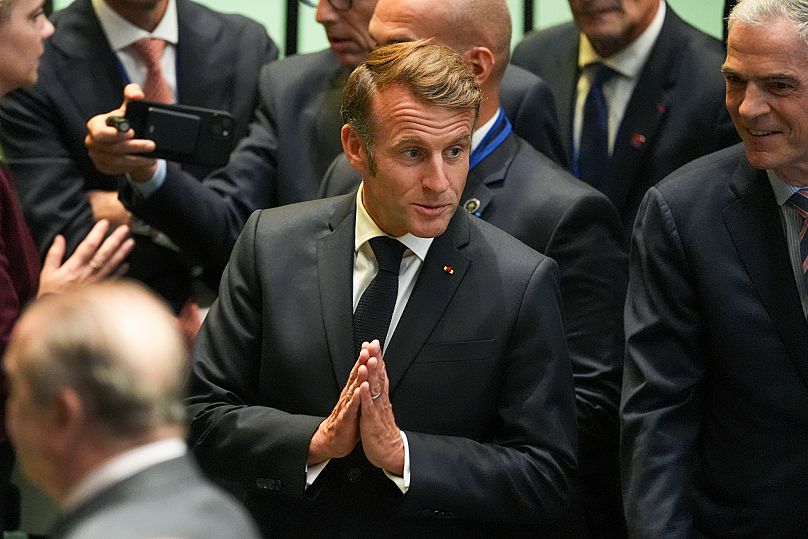France and Belgium join UK and Portugal in recognising Palestinian state

France and Belgium have joined the UK, Portugal, Canada and Australia in formally recognising a Palestinian state, the leaders of the two countries announced on Monday.
“True to the historic commitment of my country to the Middle East, to peace between the Israelis and the Palestinians, this is why I declare that today, France recognises the state of Palestine,” French President Emmanuel Macron announced while addressing the United Nations in New York, to loud applause from those in attendance.
Before making the announcement, Macron told the UN that the world was on the brink of losing its chance to achieve peace.
"We can no longer wait," the French leader said, as he condemned the 7 October attacks and called for a two-state solution.
"Nothing justifies the ongoing war", he said, adding that "everything compels us" to bring it to a definitive end.
"Belgium is sending a strong political and diplomatic signal to the world today by joining the group of countries announcing the recognition of the State of Palestine," Belgian Prime Minister Bart De Wever said.
De Wever also stated that the two-state solution was as far away as ever due to the "military operation aimed at the complete occupation of Gaza," the settler expansion in the West Bank and the "unspeakable humanitarian crisis."
Belgium has pledged €600 million in support and over €190 million in humanitarian aid to address the crisis in the Strip, De Wever stated.
France and Belgium are the latest countries to announce their recognition of a Palestinian state after the UK, Portugal, Canada and Australia did so on Sunday.
Around three-fourths of the 193-member United Nations recognise Palestine, but the majority of major Western nations had until recently declined to do so.
The creation of a Palestinian state alongside Israel in the West Bank, Gaza and east Jerusalem — territories seized by Israel in the 1967 Six-Day War — is widely seen internationally as the main way to resolve the ongoing conflict, which escalated after Hamas' 7 October attack ignited the war in Gaza nearly two years ago.
Palestinians have welcomed the moves toward recognition, hoping they might someday lead to independence.
'Will not happen'
Israeli Prime Minister Benjamin Netanyahu has yet to comment on Macron's declaration but said in a video posted before Portugal made the move that a Palestinian state "will not happen.
"A Palestinian state will not be established west of the Jordan River," he said, adding that Israel has doubled Jewish settlements in the West Bank and "will continue on this path."
Netanyahu said he would respond to the "latest attempt to impose a terrorist state" on Israel following the conclusion of Monday's UN General Assembly meeting.
Israel has opposed Palestinian statehood before the war, and now argues that recognising Palestine would reward Hamas.
The Israeli leader is under pressure from parts of his coalition government to move ahead with annexing parts of the West Bank, which would complicate Palestinian efforts.
Israel says that the internationally recognised Palestinian Authority, led by Hamas' political rivals Fatah, is not fully committed to peace and accuses it of incitement to militancy.
Hamas has repeatedly stated it might accept a state on the 1967 lines. The group is formally committed to the idea of a Palestinian state in all of the territory between the Mediterranean Sea and the Jordan River, including land that is now part of Israel.
Netanyahu said he would decide on Israel's response to the Palestinian statehood push after meeting with President Donald Trump at the White House next week, their fourth meeting since Trump returned to office.
The Trump administration is also opposed to growing recognition of a Palestinian state and blames it for the derailment of ceasefire talks with Hamas.
Today


